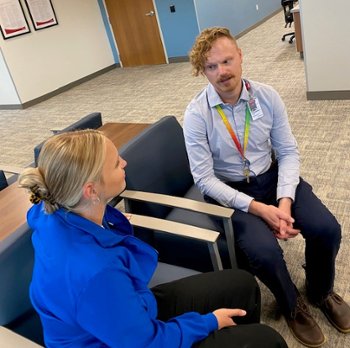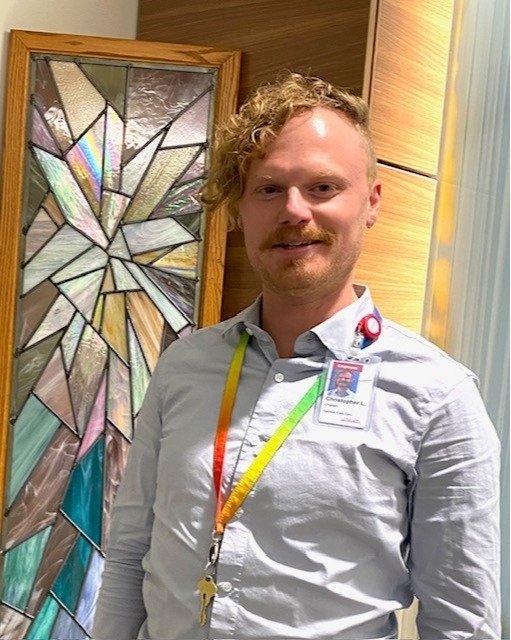Hospital chaplains provide care for patients, families and staff
Chaplains can help families understand the eye, organ, and tissue donation process.
By Rae Price - October 8, 2024
Hospital chaplains wear a wide-brimmed hat.
Hospital chaplains, like an umbrella or wide-brimmed hat, provide a level of protection and care for patients, families and hospital staff. In this role, they often provide a key role in helping families with decisions on eye, and tissue donation; offering emotional support and comfort and, as expected, spiritual guidance which can look different to each person.
Christopher Lamb is one of those chaplains, serving as head chaplain at UCHealth Poudre Valley Hospital (PVH) in Ft. Collins, Colo., where there are six other chaplains. He explained, sometimes spiritual care is not so much religious, as looking inward. “I tend to make a distinction between religious care and spiritual care. Spiritual care really being the care of the human spirit that is outside of any particular tradition or belief system, it’s really asking how I help and what brings meaning to the person. How can I help tell the story of their purpose here in this life?”
The wide hat also includes being connected with clergy of different faiths within the community. PVH is a 300-bed regional medical center, serving patients in northern Colorado, southern Wyoming and western Nebraska. With such a large service area, the potential for patients and families to have a wide range of faith beliefs is great, so it is important for Lamb to be prepared to meet all needs. When someone who is not local is in the hospital and would like to connect with clergy from their own faith, having connections with local churches and faith communities helps chaplains to fulfill that need. He noted that hospital chaplains regardless of location try to be prepared to comfort and counsel individuals under varying circumstances.
In addition to offering support for patients, Lamb and his staff are also there to help family members. He explained, “There are times when the patient themselves may not be able to interact, maybe they are in the ICU, and intubated, or sedated in the healing process; it’s in those moments that it’s often more the family care that we do, meeting with the family members, providing support, whether they are working through grief or trying to wrap their minds around different decisions that need to be made -often connecting them with resources.”
Chaplains help with eye tissue donation decisions.
When a patient dies, talking to families to help them understand or make their decision on eye and tissue donation is also the role of chaplains at PVH who serve as designated tissue requestors. The designated requestor role is important when it comes to decedents who did not put themselves on the donor registry before they died. Only people who have had special training to be a designated requestor can talk to families to obtain consent, after death, for eye and tissue donation.
Lamb said there are instances when he or the other chaplains have had time to establish relationships with families and have discussed values that are important. He said these conversations help when the patient dies, and questions about eye and tissue donation come up, and they are continuing the conversation around values. He will often explain to a family, that this is an opportunity to be the voice for their loved one and asks them to consider if eye tissue or other donation would be meaningful for their loved one as a continuation of their life story.
For decedents who had put themselves on the donor registry (also called “first person authorization”) the role of the chaplains may be to help the family understand their loved one’s legally binding decision and explain the next steps to honoring that wish.
Rocky Mountain Lions Eye Bank often hears from families of donors expressing how meaningful it is to know their loved one was able to help someone else, even after death. Chaplains may not get that feedback right away, or ever, but Lamb said there are times when he sees an immediate positive reaction, “There are times when we just make a mention that your loved one may be eligible for donation and have an opportunity to explain a little of what that means. Instantly you can see their eyes light up and a sense of, ‘oh yea! That would be really meaningful.’”
Other times, he said, people just need to talk about it and work through what it means. “I tell them their role is to be a voice for their loved ones, and I will support them in the decision; then give them space to talk it over and make sure they feel comfortable in whatever decision they make” (if their loved one had not already put themselves on the registry).
Chaplains are a support for hospital staff.

While serving patients and families is a primary focus, Lamb said staff care is also a large part of the hospital chaplain’s role. “We probably spend at least a third of our time and energy on caring for staff. I have such respect for, and love for, the staff here and the relationships that the chaplains cultivate with them are really valuable to me,” he said.
Supporting staff is reflected in a recently launched program at PVH called REST which stands for Resilience Education Support Training. Lamb explained the program is a debrief model where staff can meet as a team, or one-on-one after a challenging event. Lamb said it is a debrief process to help gain some insight and resources into how to cope with the situation and find ways to metabolize the shock or grief of the situation. He said it is beneficial so they can continue to show up as their most full selves, their most resilient selves. “I have a real passion for those debrief sessions. I think they have been so valuable. Just the process of checking in with staff and offering them support has been a big part of what we do,” said Lamb.
In an often high-stress situation like a hospital, staff care is important, especially in our culture where it’s not always viewed as OK to ask for help from a ministry or mental health professional, and sometimes seen as weakness. Lamb said PVH is trying to help normalize asking for support. “We’ve done a lot of work to try and change the culture around the stigma associated with needing help, seeking help, and understanding we’re all in this together. It is a human thing to struggle when we’re around such difficult circumstances.”
Whether caring for patients, families or staff, Lamb noted the importance of just being there to talk with or as a shoulder to lean on saying, “A compassionate presence is really central to what we offer as chaplains. A lot of what we do is companion people, to be with them in hard moments. There are so many situations where it’s beyond our power as a chaplain to fix, or to make it better, but just having a caring person there alongside them can facilitate some healing and bring a little bit of comfort to an otherwise terrible circumstance.”
It’s a personal choice to become a hospital chaplain.
Lamb’s road to becoming a hospital chaplain started during his first semester of seminary. The students had a pastoral care class that included role playing and one of those role plays was with actual hospital chaplains, which piqued his interest. While still a little unsure of what path he would take, his seminary training required 400 hours of clinical pastoral education in a hospital. He completed that at McKee Medical Center in Loveland, Colo. “I had a wonderful supervisor, and a really great experience. I left feeling confirmed that I really like this work.” When that supervisor left and moved to PVH she invited Lamb to apply there. He did and has since been happy serving PVH.
For others looking for a similar career, Lamb suggests they start with CPE, or Clinical Pastoral Education courses. He said taking the course doesn’t require a prior degree, and he completed his while attending seminary. The course, he said, “Is a wonderful opportunity to do some boots on the ground chaplaincy work and really get a sense of it.”
Rewards come with the job of being a chaplain.
At the end of the day when the big hat goes on the hook for the night, Lamb said there are many rewarding aspects of his job. Aside from helping patients work through difficult times, there are also joyful moments.
“There are some lovely moments” he said. “We get to bless babies, and offer baptisms sometimes, if parents request that. Also celebrating with parents when little ones are leaving the NICU to go home. So, those are some joyous moments.” He continued, “Also, when we are with patients who have completed cancer treatments, or finished an extensive rehab stay and are ready to discharge. We have some really sweet celebratory moments with those patients.”
Summing up his experience, Lamb said every day is different. and he feels lucky to work in an environment with a culture that recognizes spiritual health as an important aspect of overall health.
“We have wonderful conversations and encounter with folks who don’t have any particular relationship to spirituality, but everyone has some time when questions of meaning, purpose and connection come up in their lives,” Lamb said. “Having a caring partner to engage in those conversations with is valuable. We can help people feel cared for in times when they may feel really isolated.”
RMLEB appreciates the work of hospital chaplains and their role to help accomplish the mission: “To Fulfill the wishes of eye donors and their families to help another overcome blindness through transplantation and research.”
